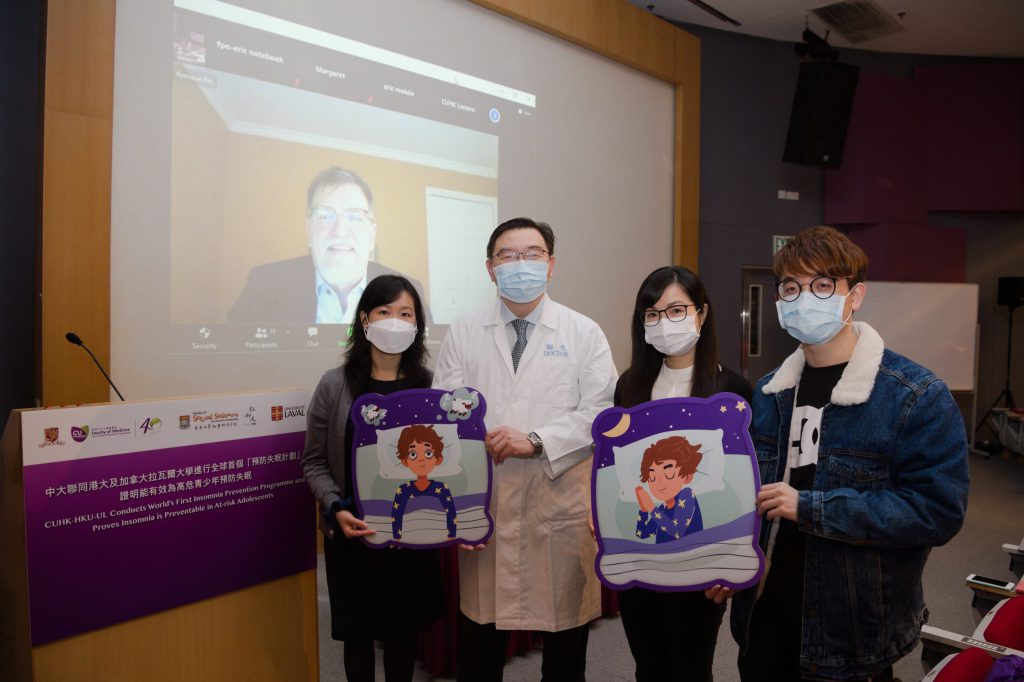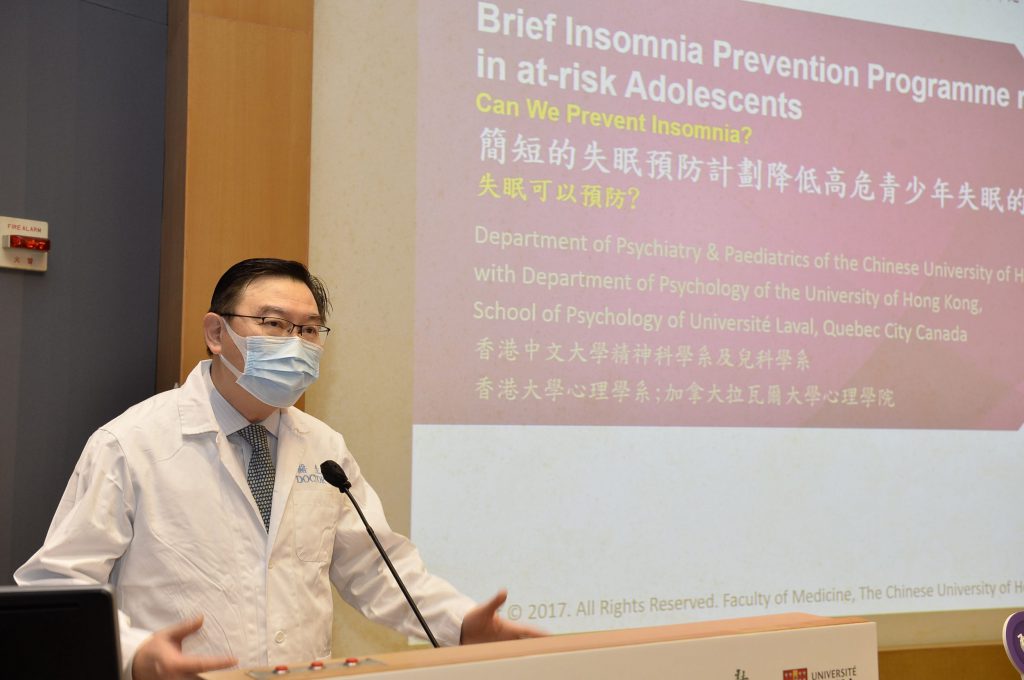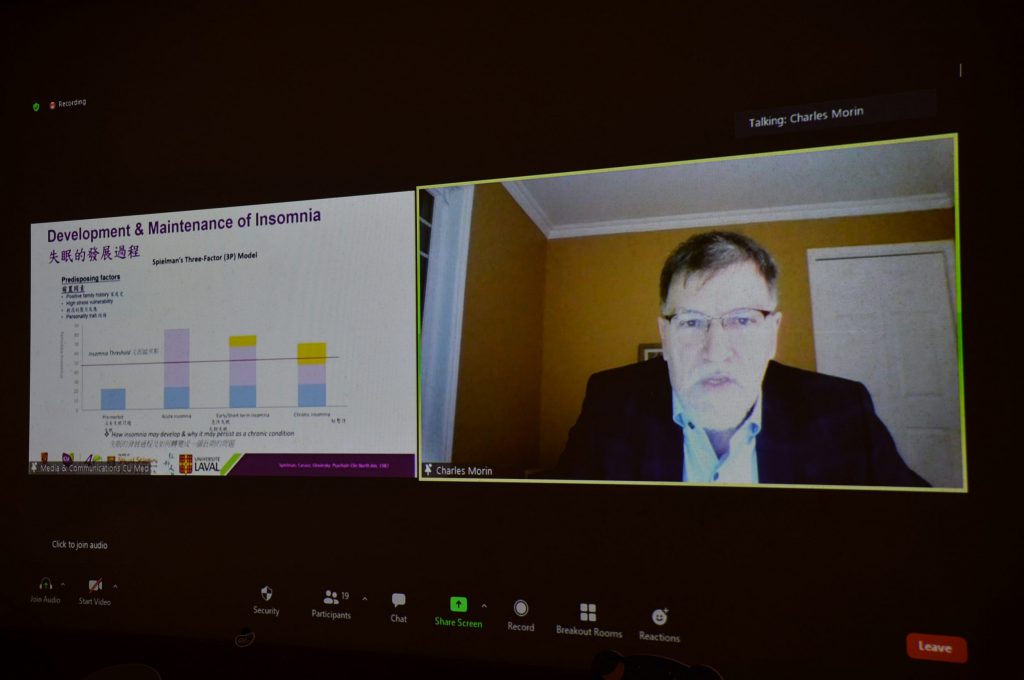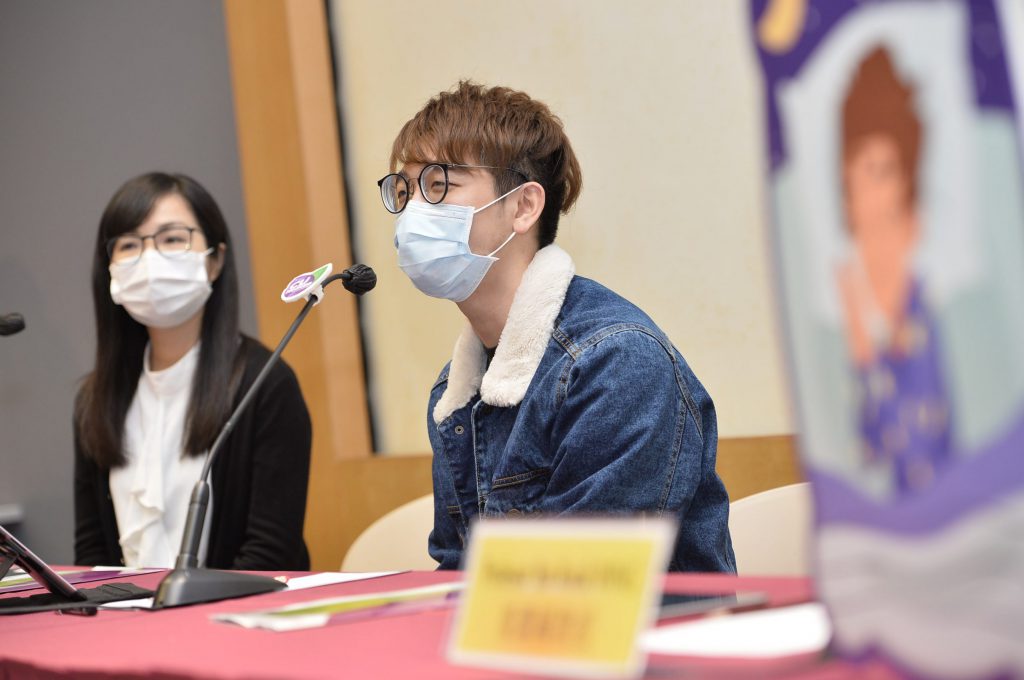CUHK
News Centre
CUHK-HKU-UL Conducts World’s First Insomnia Prevention Programme and Proves Insomnia is Preventable in At-risk Adolescents
Adolescence is a critical period accompanied by dramatic neurobiological, physical, behavioural and emotional changes, predisposing the youngsters to sleep disorders, mental and physical illnesses. It is a vulnerable period for the emergence of insomnia, affecting 10% to 36% of the adolescents. Insomnia once developed, tends to run a chronic course with considerable personal distress and health care burden.
The world’s first randomised controlled trial of brief insomnia prevention programme for at-risk adolescents has been conducted by The Department of Psychiatry of the Faculty of Medicine of The Chinese University of Hong Kong (CU Medicine), in collaboration with the Department of Psychology of the Faculty of Social Sciences of the University of Hong Kong (HKU), and the School of Psychology of Université Laval (UL), Quebec City, Canada. Results showed that there was a 71% risk reduction in the development of insomnia disorder over the 1-year follow up period.
Adolescents with family history of insomnia are at 3 times higher risk of developing insomnia than those without positive family history
Insomnia has a strong familial aggregation. Adolescents with a parent who had chronic insomnia are at 3 times the risk of developing insomnia than those without a positive family history. Previous studies showed that adolescence is a vulnerable period for the emergence of insomnia, with a notable surge in the incidence during puberty. This suggests that adolescence is the key window for preventive intervention.
Professor Yun Kwok WING, Chairman of the Department of Psychiatry, CU Medicine said, “Our group has previously found that insomnia is highly persistent and is often associated with detrimental consequences, such as cognitive impairment, poor academic performance, increased risk for physical and mood problems as well as suicidality. However, seeking help is very uncommon as only 10% of the adolescents in Hong Kong have tried to seek assistance for their insomnia problems.”
Professor Charles M Morin, Professor of Psychology, Laval University, Canada, as a pioneer of the research on cognitive behavioural therapy for insomnia (CBT-I), said, “Insomnia is increasingly recognised as a public health burden. It may result in substantial personal distress and a burden not only for the affected individuals, but also for their families and the society. Accumulative evidence strongly supported CBT-I as the first-line treatment for adult insomnia. It is a multi-component treatment package targeting behavioural, cognitive and physiological factors that perpetuate insomnia, and aims to modify and alter maladaptive behaviours and distorted beliefs about sleep and insomnia. This brief insomnia prevention programme is developed and formulated based on the traditional CBT-I treatment components with special adaptation to adolescents.”
No prior evidence that insomnia can be preventable
Dr. Shirley Xin LI, Assistant Professor, Department of Psychology, Faculty of Social Sciences at HKU, added, “There has been emerging evidence supporting the efficacy of CBT-I in treating insomnia in adolescents. However, preventive programme in this area is lacking. There are multiple interactive factors involved in the pathogenesis of insomnia. Perpetuating factors, such as poor sleep hygiene practice, distorted cognition towards sleep and maladaptive behaviours, are the modifiable factors targeted by our prevention programme. For example, adolescents were asked to chart and review their sleep schedule every week throughout the prevention programme. Behavioural strategies targeting poor sleep hygiene and cognitive strategies aiming to address negative thinking or worries associated with poor sleep were the key components in this prevention programme.”
Insomnia can be prevented – brief insomnia prevention programme reduces risk of insomnia by 71%
This joint study is the world’s first randomised controlled trial of brief insomnia prevention programme for at-risk adolescents who have a positive family history of insomnia and sub-threshold insomnia symptoms.
The research team invited 242 adolescents (mean age: 15 years old, 57% female) from local secondary schools during 2015 to 2017 to join the trial. Adolescents and their parents were invited to complete a brief screening questionnaire. Eligible adolescents were randomly assigned to either an insomnia prevention group or a non-active control group. In the intervention group, adolescents received four weekly group sessions, delivered by trained therapists, with each lasting for one hour, while the control group received no active intervention. All adolescents were reassessed at post-intervention or week 5 (for the control group), and they were followed up after 6 months and 12 months. The results have just been published in the leading international journal Pediatrics.
Below are the main findings:
|
Over the 12-month follow up period |
Insomnia prevention |
Control group |
|
Incidence of insomnia disorders |
5.8% |
20.7% |
|
Risk of insomnia development |
71% lower in the intervention group compared to the control group |
|
|
Insomnia symptoms |
fewer |
more |
|
Vulnerability to stress-related insomnia |
lower |
higher |
The research team also observed that adolescents in the intervention group had increased total sleep time, decreased level of daytime sleepiness, and better sleep hygiene at post-intervention.
Dr. Rachel Ngan Yin CHAN, Research Assistant Professor from the Department of Psychiatry, CU Medicine, remarked, “Adolescents who received the brief cognitive behavioural insomnia prevention programme had 71% reduced risk of developing insomnia compared to those in the control group. Moreover, the programme completion rate is very high (94% of the adolescents), indicating the feasibility and high acceptability of this prevention intervention in adolescents. This study provides promising and novel evidence that insomnia can be prevented in at-risk adolescents through a brief cognitive behavioural prevention programme.”
Professor Yun-Kwok WING concluded, “This brief insomnia preventive intervention not only reduced the risk of developing future insomnia but also improved associated vulnerability factors and functional outcomes in at-risk adolescents. We are excited to see these results because insomnia is a common sleep problem and may lead to negative health related outcomes in the long run. We are looking forward to further exploring the implementation of the insomnia prevention programme in the general population and assessing the impact of the programme in reducing the healthcare burden in the future.”
The full text of the research paper can be found: https://pubmed.ncbi.nlm.nih.gov/33627370/
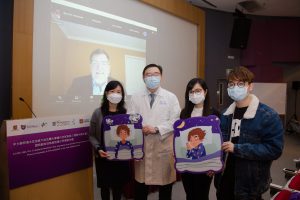
The Department of Psychiatry of CU Medicine, in collaboration with the Department of Psychology of the Faculty of Social Sciences of HKU, and the School of Psychology of Université Laval, Quebec City, Canada, has conducted the world's first randomised controlled trial of brief insomnia prevention programme for at-risk adolescents. (From left) Professor Charles Morin, Professor of Psychology of Laval University, Canada (zoom image on screen); Dr. Shirley LI, Assistant Professor, Department of Psychology, Faculty of Social Sciences, HKU; Professor Yun Kwok WING, Chairman, and Dr. Rachel CHAN, Research Assistant Professor, Department of Psychiatry, CU Medicine; and Tommy, a participant of the programme.
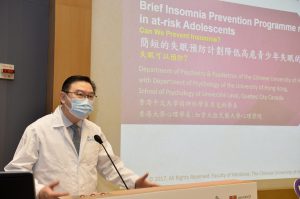
Professor Yun Kwok WING states that it is very uncommon for the insomnia cases to seek help. Only 10% of adolescents in Hong Kong have tried to seek assistance for their insomnia problems.

Professor Charles Morin points out that insomnia is a critical public health issue. It may result in substantial personal distress and a burden not only for the affected individuals, but also for their families and society.
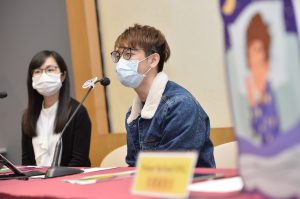
Tommy (right) said that after participating in the insomnia prevention programme, he understood that he had been too worried about insomnia in the past and thus making him too stressful to fall asleep. He learned to reduce the screen time and do more reading before going to bed can help him to prevent insomnia.


